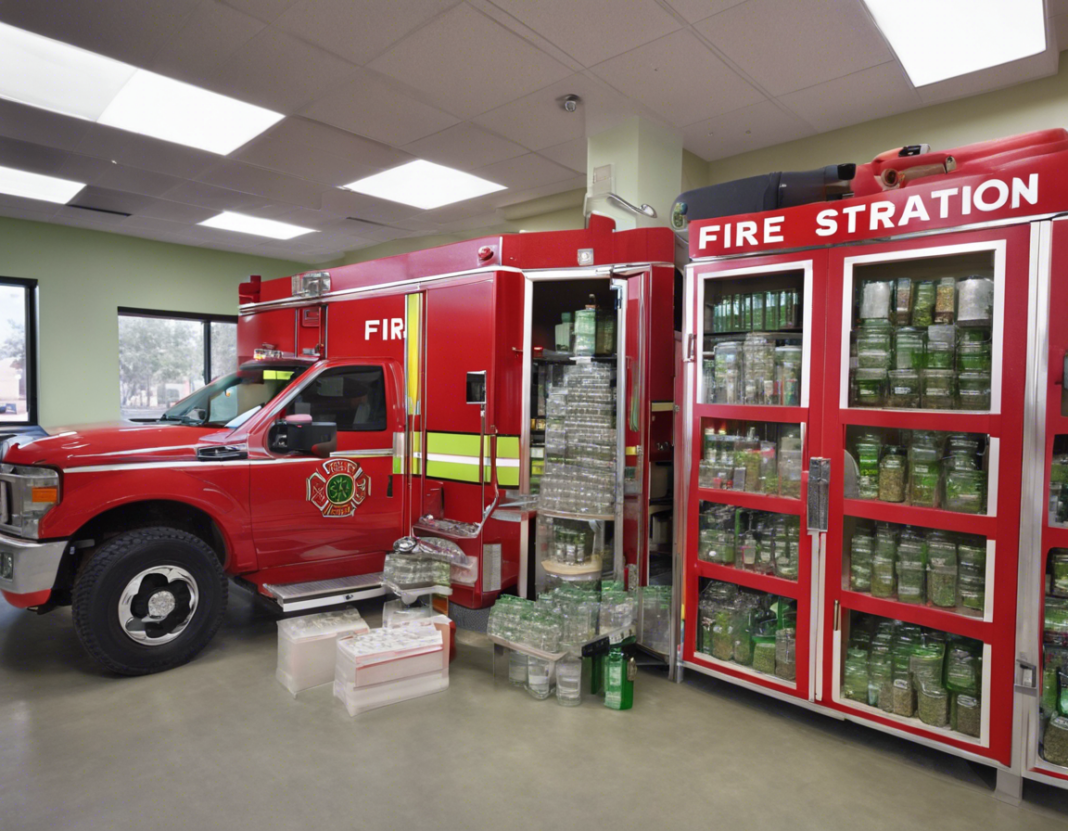Introduction
As the cannabis industry continues to expand and evolve, innovative approaches to dispensary locations are becoming more prevalent. One such approach is the transformation of fire stations into dispensaries, a concept that is gaining traction in various cities across the United States. In this article, we will delve into the unique benefits and challenges of repurposing these iconic buildings, exploring the implications for both the cannabis industry and the communities that these establishments serve.
The Trend Towards Adaptive Reuse
Adaptive reuse, the practice of repurposing existing structures for new uses, is becoming increasingly popular for a variety of reasons. From an environmental standpoint, adapting existing buildings can help reduce waste and limit the carbon footprint associated with new construction. In the case of fire stations, which are typically well-built structures with unique architectural features, the potential for conversion into dispensaries presents an exciting opportunity to preserve these historically significant buildings while breathing new life into them.
Benefits of Transforming Fire Stations into Dispensaries
-
Central Locations: Fire stations are often located in the heart of communities, making them ideal locations for dispensaries that seek to serve a wide customer base.
-
Community Connection: Fire stations hold a special place in the hearts of many community members, and transforming them into dispensaries can create a sense of familiarity and trust among local residents.
-
Security: Fire stations are designed to prioritize safety and security, making them ideal locations for dispensaries, which often handle large amounts of cash and valuable products.
-
Unique Aesthetics: Fire stations are often architecturally stunning buildings that can lend a sense of character and history to dispensaries, helping them stand out in a crowded market.
-
Regulatory Approval: In some cases, repurposing a fire station for use as a dispensary may be easier than securing approval for new construction, as the building already has certain infrastructural requirements in place.
Challenges and Considerations
While the transformation of fire stations into dispensaries offers numerous benefits, there are also several challenges and considerations that must be taken into account:
-
Zoning Regulations: Local zoning regulations may dictate what types of businesses can operate in a given area, so obtaining the necessary permits and approvals for such a conversion can be complex.
-
Historic Preservation: If a fire station is deemed a historic building, additional approvals and regulations may be required to ensure that any renovations or modifications comply with preservation standards.
-
Community Opposition: Some community members may have reservations about repurposing a fire station for a cannabis dispensary, citing concerns about safety, aesthetics, or perceived impacts on property values.
-
Logistical Considerations: Fire stations are designed for specific purposes, so adapting them to meet the needs of a dispensary, such as installing security systems, ventilation, and retail space, may require significant investments of time and money.
Case Studies in Fire Station Dispensaries
Several cities have already embraced the concept of transforming fire stations into dispensaries, with promising results. One notable example is the City of Los Angeles, which recently converted a historic fire station into a state-of-the-art cannabis dispensary. By preserving the architectural integrity of the building while outfitting it with modern amenities, the city was able to create a unique and welcoming space for cannabis consumers while honoring the history of the fire station.
In San Francisco, a similar project is underway to convert a decommissioned fire station into a community-focused dispensary that will offer a range of cannabis products and educational resources. By partnering with local organizations and community groups, the dispensary aims to create a hub for wellness and education, leveraging the existing infrastructure of the fire station to serve the needs of a diverse population.
Frequently Asked Questions (FAQs)
- Are there any legal barriers to repurposing a fire station as a dispensary?
-
While there are no specific laws that prohibit the conversion of fire stations into dispensaries, local zoning regulations and permitting processes may vary, so it’s important to consult with legal experts and local authorities before proceeding with such a project.
-
How can community concerns about safety and security be addressed in a fire station dispensary?
-
Implementing robust security measures, such as surveillance cameras, alarm systems, and controlled access points, can help address community concerns and ensure a safe environment for both customers and employees.
-
What are some best practices for preserving the historic integrity of a fire station during the conversion process?
-
Working with preservation experts, architects, and historians can help ensure that any renovations or modifications are done in a way that respects and preserves the unique history and architectural features of the fire station.
-
How can fire station dispensaries contribute to the local community beyond providing cannabis products?
-
Fire station dispensaries have the potential to serve as community hubs, offering educational workshops, wellness programs, and other resources that benefit residents beyond the sale of cannabis products.
-
What are the economic implications of repurposing fire stations into dispensaries?
- By revitalizing underutilized buildings and creating new business opportunities, fire station dispensaries have the potential to stimulate local economies, attract new customers, and generate tax revenue for municipalities.
Conclusion
The transformation of fire stations into dispensaries represents a unique and innovative approach to cannabis retail that offers numerous benefits for both businesses and communities. By leveraging the existing infrastructure and historical significance of these buildings, fire station dispensaries have the potential to become trusted community landmarks that provide not only high-quality cannabis products but also valuable resources and support for residents. As the cannabis industry continues to evolve, this trend towards adaptive reuse holds promise for sustainable growth and development in the years to come.




